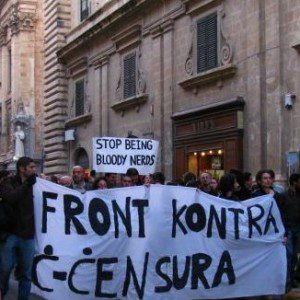
The author of a fictional story of sexual conquests may yet face jail on the conservative Mediterranean island. Charles Young reports
The Maltese government is challenging the acquittal of a student editor and an author whose short story fell foul of obscenity laws.
Malta’s Attorney General is claiming their explicit short story, which detailed a Maltese man’s sexual conquests offended public morality and that freedom of speech was “far from absolute”.
The move comes just days after Mark Camilleri, editor of the Ir Realta newspaper, and author Alex Vella Gera were cleared of all charges of distributing obscene or pornographic material and undermining public morals or decency, under both the Criminal Code and the Press Act. A guilty verdict could have seen them jailed for up to nine months.
Last month, the court ruled the prosecution had produced no evidence to define public morality in Malta and how it had been infringed.
It added that what offended public morals 20 or 30 years ago did not necessarily do so today.
But the Attorney General Peter Grech has now filed a 32-page appeal arguing the magistrate’s decision was wrong.
“The author must realise that there are other people living with him who do not share his same ideas, preferences or tastes and that there is God above everything and everyone — God, who is definitely bigger than the biggest ego of the most celebrated authors,” writes Dr Grech, who lectures at the University of Malta on media law and freedom of expression.
Dr Grech pointed out that the story was thought to be obscene by the highest authorities of the University, including the Rector himself, who had alerted the authorities. He said freedom of expression was “far from absolute”. “This right must bow its head completely if the competent court decides that it is in the interest of defence, public security, public order or public morality or decency.”
He also complained about the use of a swearword against the Virgin Mary which should not be acceptable in writing if it was a crime to say the same word in public. He pointed out that the author also used words such as “God” not in a religious context or a critical analysis but in a sexual manner.
The readers — who he said were as young as 15, since the newspaper was distributed at Junior College — were given no indication that this was a fictitious story. At no point did the author or the newspaper distance themselves from the thoughts of the main character in the story.
Dr Grech said the story explicitly referred to various sexual acts, “both vaginal and anal”, in grave detail and precision, not only aiming to shock the reader but to appeal to their libido.
Camilleri and Vella Gera have always insisted the story’s literary value depended on the reader’s revulsion at the narrator’s macho attitude.
Although he agreed that public morality changed over time, Dr Grech made it a point to say that these changes were not necessarily taking the country in the right direction. Just because all sort of information was now widely accessible, did not mean that everything was now acceptable.
Malta’s opposition Labour party and the pressure group Alternattiva Demokratika criticised the decision to appeal the court’s judgment and said the country’s laws needed to be modernised.
The Labour party said it was “obscene” that the government was in favour of sending authors to jail for writing a completely fictitious story.
Charles Young’s documentary about censorship in Malta will be broadcast on Al Jazeera English at 11.30pm (BST) on 5 April.
Subscribe to Index on Censorship magazine and read Do Not Disturb – Charles Young’s in-depth report on Malta’s libel laws





